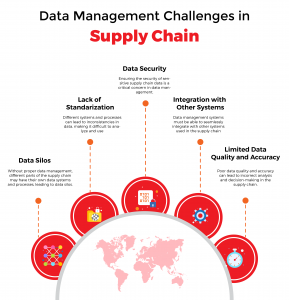Retail Data Management in Supply Chain Management

Supply chain management is the process of arranging, coordinating, and controlling the movement of products and services from suppliers of raw materials to end users. This entails keeping an eye on what producers, distributors, suppliers, warehouses, and other supply chain participants are doing.
Data management is a crucial element of efficient supply chain management since it can raise customer satisfaction, lower costs, and increase productivity.

Data management is essential to supply chain management for a number of reasons:
- Transparency and Visibility
By gathering and examining data on the flow of goods and services, businesses can gain a deeper understanding of the inefficiencies present in supply chains. In order to maximise the flow of goods and services, they can make well-informed decisions and identify areas that require improvement thanks to this. - Accurate Estimates
Data analysis helps businesses predict demand more accurately by looking at historical performance and demand trends. This lowers the cost of inventory, lost revenue, and excess or understock. - Risk Management
Data management enables companies to identify potential problems with supplier performance and take appropriate action before they have an adverse effect on business operations. This guarantees that products and services are delivered to customers on schedule and lessens harm to the supply chain. - Improved Efficiency
Data analysis enables businesses to identify issues and inefficiencies in supply chains and then take appropriate action to improve them. For instance, identifying a supplier who is frequently late enables us to address important problems and raise supply chain efficiency overall. - Cost Reduction
Data analysis finds areas where costs can be cut throughout the supply chain. Supply chain operations become more economical and efficient when data is managed well. Reducing excess inventory, streamlining transportation and logistics, and negotiating better terms with suppliers are some ways to accomplish this.
Data management plays a pivotal role in the realm of supply chain management. Its significance lies in enhancing visibility and transparency, enabling more accurate demand estimates, facilitating risk management, enhancing efficiency, and ultimately reducing costs throughout the supply chain. By harnessing the power of data analysis, businesses can identify areas for improvement, optimize operations, and foster stronger relationships with suppliers and consumers alike. Embracing effective data management practices is not just a competitive advantage but a necessity for businesses striving to thrive in today’s complex and dynamic marketplace.
Ready to optimize your supply chain management through effective data management practices? Let’s take the first step together. Reach out now to schedule a consultation and discover how we can support your business in maximizing efficiency, reducing costs, and enhancing customer satisfaction. Don’t wait to unlock the power of data to transform your supply chain today!


